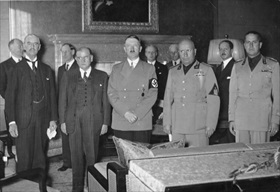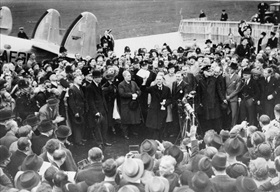POMP AND CEREMONY CELEBRATE FRENCH DEFEAT
Berlin, Germany · July 19, 1940
Military operations between France and the Axis powers, that is, Germany and Italy, ended on June 25, 1940. Three and a half weeks later, on this date in 1940 in Berlin, victorious Wehrmacht troops marched through the Brandenburg Gate for the first time since Kaiser Wilhelm I’s victory over France in the Franco-Prussian war in 1871. Adolf Hitler handed out ranks and decorations to the grossly corpulent Air Marshal Hermann Goering, now promoted to the rank of Reichsmarshall, as well as to other generals who had served in the Battle of France (May 14 to June 20, 1940). Speaking before the august assembly, Hitler held out an olive branch to Great Britain, which, like defeated France, had declared war on Germany on September 3 the year before. The incorrigible aggressor told the new British Prime Minister, Winston Churchill, in his speech that he did not wish to continue the military struggle against the lone holdout against Nazi domination in Europe. “My conscience dictates that I should send a new appeal to reason to England,” he stated. “I think I can do this because I am not a defeated enemy who is begging but a victor who has nothing to ask. I do not wish for any reason to continue this struggle.” The next day Hitler received the British response: Germany could only have peace if it evacuated all the territories it had occupied since the outbreak of war, restored the freedoms it had trampled on, and gave guarantees for a peaceful future. This last requirement seemed an odd one, for Churchill’s predecessor, Neville Chamberlain (in office from May 1937 to May 1940), held aloft a memorandum that he and Hitler had signed, waving it to a cheering crowd upon his return from Munich at the end of September 1938. “To assure the peace of Europe,” the two leaders “resolved that the method of consultation shall be the method adopted to deal with . . . questions that may concern our two countries.” The Munich Agreement, the signature achievement of his administration, Chamberlain assured an anxious world, had produced “peace with honor,” “peace for our time.” On sensing a change of attitude in Britain’s new and feisty prime minister, a disappointed Hitler retired to the Berghof, his Bavarian mountain retreat on the Obersalzberg near Berchtesgaden, wondering why his peace overture had fallen on stone cold ears.
![]()
[amazon_carousel widget_type=”ASINList” width=”600″ height=”200″ title=”Recommended Reading” market_place=”US” shuffle_products=”False” show_border=”False” asin=”1591142954,0465031285,071904832X,1439132348,0192805509,0060575735,0333417135,143919100X,041545865X,0465022057″ /]
Sudetenland Crisis and Munich, 1938: Apogee of European Appeasement
 |  |
Left: British Prime Minister Neville Chamberlain, French Prime Minister Édouard Daladier, German Chancellor Adolf Hitler, Italian Prime Minister Benito Mussolini, and Italian Foreign Minister Galeazzo Ciano pictured (left to right) before signing the Munich Agreement shortly after 1 a.m., September 30, 1938. The “Czechoslovakian problem,” as Chamberlain framed the dispute between Germany and its southern neighbor, was resolved by detaching Czechoslovakia’s mostly German-speaking Sudetenland and handing it over to Germany. The Czechoslovak government in Prague objected to the agreement reached by Europe’s Big Four, but agreed to its terms when informed (essentially blackmailed) that should a war break out Czechoslovakia would be held responsible. The Munich Agreement would culminate six months later in Hitler’s takeover of what was left of Czechoslovakia.
![]()
Right: On his triumphal return from Munich on September 30, 1938, Chamberlain holds aloft the certified promise he and Hitler had made to each other a few hours earlier; namely, a solemn commitment to resolve differences between their two countries peacefully. He assured British subjects twice that day, those cheering him at the airport upon his arrival and those mobbing him at his residence at 10 Downing St. in the evening, that the fruits of his trip had produced “peace for our time.” After the second assurance, he told the crowd to “go home, and sleep quietly in your beds.”
Chamberlain and Hitler’s 1938 Resolution to Work for the Peace of Europe
![]()

 History buffs, there is good news! The Daily Chronicles of World War II is now available as an ebook for $4.99 on Amazon.com. Containing a year’s worth of dated entries from this website, the ebook brings the story of this tumultuous era to life in a compelling, authoritative, and succinct manner. Featuring inventive navigation aids, the ebook enables readers to instantly move forward or backward by month and date to different dated entries. Simple and elegant! Click
History buffs, there is good news! The Daily Chronicles of World War II is now available as an ebook for $4.99 on Amazon.com. Containing a year’s worth of dated entries from this website, the ebook brings the story of this tumultuous era to life in a compelling, authoritative, and succinct manner. Featuring inventive navigation aids, the ebook enables readers to instantly move forward or backward by month and date to different dated entries. Simple and elegant! Click 











